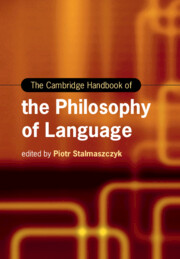Book contents
- The Cambridge Handbook of the Philosophy of Language
- Cambridge Handbooks in Language and Linguistics
- The Cambridge Handbook of the Philosophy of Language
- Copyright page
- Contents
- Figures
- Tables
- Contributors
- Preface
- 1 Philosophy of Language: Definitions, Disciplines, and Approaches
- Part I The Past, Present, and Future of Philosophy of Language
- Part II Some Foundational Issues
- 5 Philosophy of Language, Ontology, and Logic
- 6 Frege’s Legacy in the Philosophy of Language and Mind
- 7 Metasemantics and Metapragmatics: Philosophical Foundations of Meaning
- 8 Internalist Perspectives on Language
- 9 Semantic Content and Utterance Context: A Spectrum of Approaches
- 10 Semantic Minimalism and Contextualism in Light of the Logicality of Language
- Part III From Truth to Vagueness
- Part IV Issues in Semantics and Pragmatics
- Part V Philosophical Implications and Linguistic Theories
- Part VI Some Extensions
- References
- Index
6 - Frege’s Legacy in the Philosophy of Language and Mind
from Part II - Some Foundational Issues
Published online by Cambridge University Press: 12 November 2021
- The Cambridge Handbook of the Philosophy of Language
- Cambridge Handbooks in Language and Linguistics
- The Cambridge Handbook of the Philosophy of Language
- Copyright page
- Contents
- Figures
- Tables
- Contributors
- Preface
- 1 Philosophy of Language: Definitions, Disciplines, and Approaches
- Part I The Past, Present, and Future of Philosophy of Language
- Part II Some Foundational Issues
- 5 Philosophy of Language, Ontology, and Logic
- 6 Frege’s Legacy in the Philosophy of Language and Mind
- 7 Metasemantics and Metapragmatics: Philosophical Foundations of Meaning
- 8 Internalist Perspectives on Language
- 9 Semantic Content and Utterance Context: A Spectrum of Approaches
- 10 Semantic Minimalism and Contextualism in Light of the Logicality of Language
- Part III From Truth to Vagueness
- Part IV Issues in Semantics and Pragmatics
- Part V Philosophical Implications and Linguistic Theories
- Part VI Some Extensions
- References
- Index
Summary
Leibniz (1646–1716) claimed that language is the mirror of the mind. Since, unlike the omniscient God, we do not have direct access to other people’s minds, we can grasp what they think, wish, believe, etc. via the sentences they use in the expression of their thoughts. So the story goes. Frege reinforces this view when he initiated what is now known as the linguistic turn. Actually, according to Dummett (1993), Frege is the father of analytic philosophy insofar as he stressed that in order to explain what a thought is we have to focus on the sentence used to voice it. Thus, language takes priority in order of explanation. For, following Dummett, there are two axioms of analytic philosophy: (i) a philosophical account of thought can be attained through a philosophical account of language and (ii) a comprehensive account can only be so attained.
- Type
- Chapter
- Information
- The Cambridge Handbook of the Philosophy of Language , pp. 124 - 138Publisher: Cambridge University PressPrint publication year: 2021

